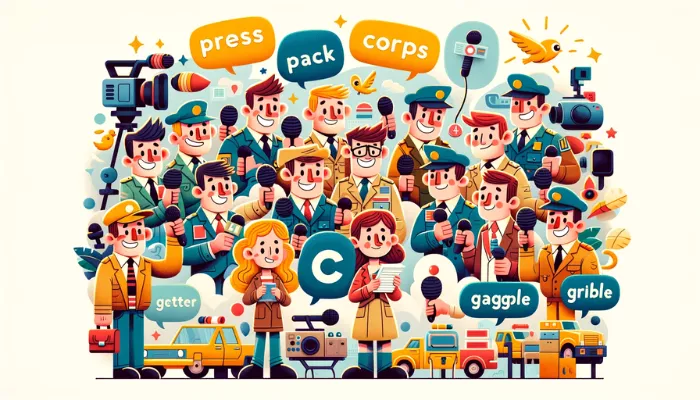Collective nouns are special words used to describe a group of people, animals, or things. For journalists, these nouns can be particularly interesting. Let us dive into the world of collective nouns for journalists.
Collective Noun for Journalists in table
| Noun | Collective Noun | Definition | Example |
|---|---|---|---|
| Journalist | Press | Group of journalists | A press of journalists gathered at the news conference. |
| Journalist | Pack | Aggressive group of reporters | A pack of journalists chased the celebrity down the street. |
| Journalist | Corps | Professional group of reporters | The foreign press corps covered the event thoroughly. |
| Journalist | Gaggle | Informal group of reporters | A gaggle of journalists waited outside the courtroom. |
| Journalist | Brigade | Large, organized group | The news brigade reported live from the scene. |
Detailed Explanations and Examples for Journalists
1. Press
Explanation: The term press refers to a group of journalists collectively. It emphasizes their role in providing news and information.
Examples:
- A press of journalists gathered to hear the President’s speech.
- The event was heavily covered by the press.
- She addressed the press, hoping to clear up the rumors.
2. Pack
Explanation: Pack”describes a group of journalists, often emphasizing their persistence and sometimes aggressive nature in seeking news.
Examples:
- A pack of journalists crowded around the movie star.
- The politician faced a pack of journalists asking tough questions.
- A pack of journalists waited outside the hospital for updates.
3. Corps
Explanation: The term corps is used for a professional group of journalists, often those who are stationed in foreign countries.
Examples:
- The White House press corps is very knowledgeable about politics.
- The foreign press corps reported on the conflict from the front lines.
- She joined the press corps and traveled to cover international news.
4. Gaggle
Explanation: Gaggle is an informal term for a group of reporters, often used humorously.
Examples:
- A gaggle of journalists waited outside the court for the verdict.
- The actor was surrounded by a gaggle of journalists at the premiere.
- The press secretary addressed a gaggle of journalists in the briefing room.
5. Brigade
Explanation: Brigade refers to a large, organized group of journalists, usually working together on a big story.
Examples:
- The news brigade covered the election results all night.
- A brigade of journalists followed the campaign trail closely.
- The rescue operation was reported by a brigade of journalists.
Conclusion
Collective nouns help us describe groups of journalists in different contexts. From a press to a brigade, each term gives us a unique way to visualize and understand the world of journalism.
Quiz Time!
1. What is the collective noun for a group of professional journalists, especially those stationed in foreign countries?
- a) Pack
- b) Corps
- c) Gaggle
- d) Press
2. Which collective noun is often used humorously to describe a group of reporters?
- a) Brigade
- b) Press
- c) Gaggle
- d) Pack
3. What term describes a large, organized group of journalists, usually working on a big story?
- a) Corps
- b) Gaggle
- c) Brigade
- d) Press
4. Which collective noun emphasizes the persistence and sometimes aggressive nature of journalists?
- a) Press
- b) Pack
- c) Corps
- d) Gaggle
5. What is the general collective noun for a group of journalists providing news and information?
- a) Pack
- b) Brigade
- c) Press
- d) Gaggle
Answers
- b) Corps
- c) Gaggle
- c) Brigade
- b) Pack
- c) Press

